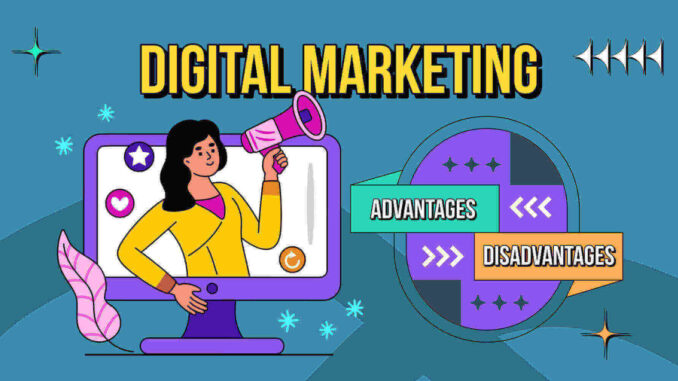
Over the past two decades, marketing has taken a digital form, and with the widespread use of the internet, it has evolved into digital marketing with its own unique identity.
Digital marketing is performed on websites, search engines, email, or social media platforms where a mass audience gets aware of a brand or product. If selling products online is the aim of e-commerce, then digital marketing helps businesses make that possible.
The benefits of digital marketing are endless, and we can go on and on to discuss them. And while we discuss the advantages, why not talk about some disadvantages of digital marketing? Let’s make a list of both! But first, let’s start with the basics if you are new to digital marketing.
Definition of Digital Marketing
Digital marketing is the practice of reaching audiences online via digital channels with the goal of turning them into customers. A digital channel is any communication method or platform a business can use to reach its target audience online.
Like a coin, digital marketing has both sides when it comes to the advantages and disadvantages. In this article, we are going to discuss the advantages and disadvantages of digital marketing with some valid points.
Advantages of Digital Marketing
The form of digital marketing was focused on being more advantageous than traditional marketing. There are more upsides of digital marketing vs traditional marketing than you think.
There are various aspects of digital marketing advantages over regular marketing. Some of the top advantages of digital marketing are listed here.

Cost-Effective
Digital marketing is one of the most cost-effective ways to reach potential customers compared to traditional marketing. It helps save money and time by targeting the right audiences with relevant content.
This advantage is handy for small businesses with limited resources and infrastructures which are not ready for big-budget advertising. Cost-effectiveness is one of the top benefits.
Digital marketing allows you to personalize your campaigns according to the needs and preferences of your customers. This helps build a better relationship with your customers.
Targeted advertising helps save money and reaches out to the audience who needs the product or service.
Easier to Measure Results
Digital analytics tools dedicated to digital marketing can easily track online metrics and data. This data can be used to gain valuable insights and adjust future campaigns to maximize results.
Digital marketing also allows for quicker optimization of campaigns, as data can be gathered and used to optimize campaigns in real-time. This helps to significantly reduce costs, as well as time spent on campaigns.
Interactivity
Digital marketing campaigns are highly interactive and allow for two-way communication between the customer and the business. This can involve activities such as commenting, rating, liking, or sharing content on social media, playing games, taking surveys, or even submitting feedback.
Additionally, this type of interactivity can lead to better customer service, as customers are able to provide their feedback in real-time and have their voices heard.
Improved conversion rate
Conversion refers to the rate at which visitors to a website are converted into customers. It is one of the major advantages of digital marketing.
Digital marketing techniques such as SEO, PPC, social media marketing, content marketing, and email marketing can help to increase the conversion rate by ensuring that your website is seen by the right people at the right time.
With a higher conversion rate, businesses can increase their revenue and maximize their ROI.
Brand Development
Another top benefit of online digital marketing is the brand development of your business. To create a strong online presence for your brand, digital marketing is a must.
It can help increase the brand awareness and brand value of a business through personalized content tailored to the audience’s perspective.
As we say, a brand is not just about the name or products; it’s about its voice and the message required to be established in the market. And digital marketing can deliver that voice and message to a huge audience base with ease.
All the aforementioned points are the top benefits. It really shows why companies are drawn towards digital marketing to run campaigns and promote their products.
Now we move to the flipside of digital marketing.
Disadvantages of Digital Marketing
As there’s no perfect thing in life, digital marketing also comes with some drawbacks.
Here’s what we found out about the disadvantages of digital marketing over the traditional style of marketing.
The main disadvantages of digital marketing are-

Difficulty standing out
With the rise of digital marketing, more and more businesses are trying to get noticed in the digital world. This leads to a crowded marketplace where all brands compete for the same attention. It can be difficult to stand out from the crowd and make an impact, especially if you are a smaller business.
Additionally, digital marketing can be difficult to measure and track, making it difficult to determine which strategies are most effective for your business.
Increased risk of being ignored
As online platforms become increasingly cluttered, it can be difficult to differentiate a brand’s message from the millions of other messages being sent at the same time. Consumers can easily become overwhelmed and simply tune out, ignoring the message completely.
Another issue is that with so much content being pushed out, consumers may become fatigued and ignore any digital marketing messages altogether. As such, it can be difficult to make an impression on potential customers and convert them into actual purchasers.
Issues with data security
Data security is a major issue when it comes to digital marketing. With the increased use of digital technologies, the risk of data breaches and security threats is growing.
Data breaches can occur due to malicious hackers, malware, phishing attacks, and other cyber threats. Such incidents can lead to the loss of confidential customer information, damaging a company’s reputation and resulting in financial losses.
Lack of face-to-face interaction
Digital marketing is a great way to reach a wide audience, but it has some disadvantages, such as the lack of face-to-face interaction.
Without the physical presence of a customer service representative or salesperson, customers cannot ask questions or receive direct help. This limits the customer’s ability to make an informed decision, which can lead to dissatisfaction or distrust.
Without the opportunity to interact with customers in person, businesses can struggle to build relationships and trust with their customers.
Although digital marketing is a great way to reach a wide audience, it should be used in combination with traditional marketing to ensure that customers have a satisfactory experience.
Privacy concerns
Digital marketing involves collecting and using customer data to personalize and improve the customer experience, but this usage of data exposes customers to the risk of their data being exposed to unauthorized individuals.
It can include the risk of customers’ personal information being leaked, their data being sold to third parties, or even their data being used for malicious purposes. This can lead to a breach of trust between the customer and the company and could lead to a loss of customers.
As customers become more aware of how their data is being used, they are increasingly concerned by how companies are using their data and are likely to look for companies they can trust with their data.
Time-consuming
Digital marketing can be an effective way to reach potential customers and build a business’s brand, however, it can also be a time-consuming process. Digital marketing requires a significant amount of planning, research, and execution.
Businesses must identify the right channels to use, develop an effective strategy, create content, and then analyze the results. This process can take days or weeks, depending on the complexity of the project and the resources available to the business.
Dependent on technology
The whole concept of digital marketing is based on the internet, which is purely technological. And we all know that the internet is not outside of mistakes. Times might come when a link gets broken, the landing page will not load, and the page buttons crash.
These issues are not an excellent impression to a customer. They even cause customers to switch brands. Many brands without prior experience in digital marketing suffer the most from this because of not performing website tests.
That’s why being fully dependent on technology can be a disadvantage of digital marketing.
Final Thoughts
Digital marketing has more potential than traditional marketing in many aspects. While there are certain digital marketing benefits, you will often find it disadvantageous if not used effectively.
Before diving into the world of marketing online, you should consider the advantages and disadvantages of digital marketing you are going to face. Do your market research and competitive analysis and don’t forget the tips we’ve listed.

Author: Romeo Nicholas Rozario
Romeo is a creative content writer for WPManageNinja and a tech enthusiast. On the flip side, a musician by passion when he’s free.
The post Digital Marketing: Advantages and Disadvantages appeared first on WP Manage Ninja.

Leave a Reply